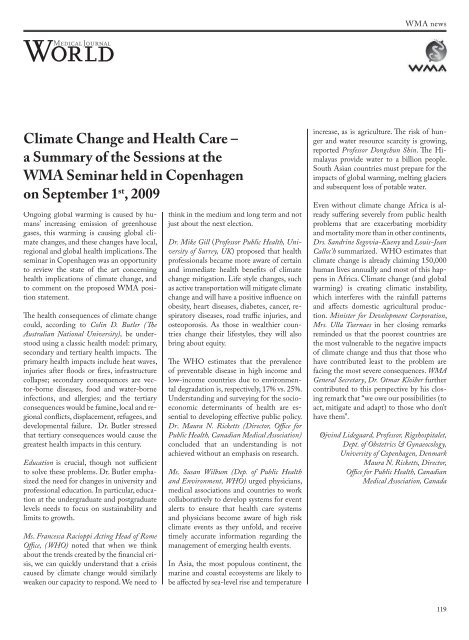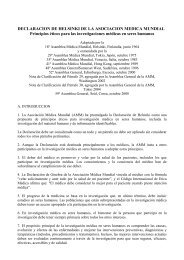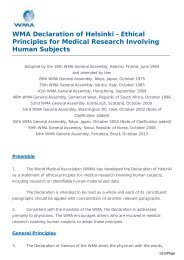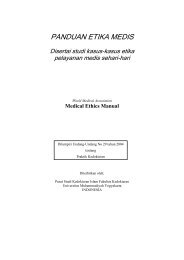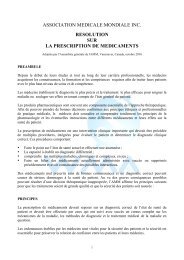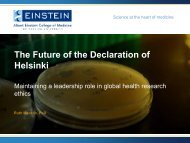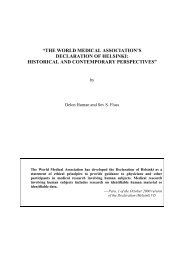wma 7-2.indd - World Medical Association
wma 7-2.indd - World Medical Association
wma 7-2.indd - World Medical Association
Create successful ePaper yourself
Turn your PDF publications into a flip-book with our unique Google optimized e-Paper software.
WMA news<br />
Climate Change and Health Care –<br />
a Summary of the Sessions at the<br />
WMA Seminar held in Copenhagen<br />
on September 1 st , 2009<br />
Ongoing global warming is caused by humans’<br />
increasing emission of greenhouse<br />
gases, this warming is causing global climate<br />
changes, and these changes have local,<br />
regional and global health implications. The<br />
seminar in Copenhagen was an opportunity<br />
to review the state of the art concerning<br />
health implications of climate change, and<br />
to comment on the proposed WMA position<br />
statement.<br />
The health consequences of climate change<br />
could, according to Colin D. Butler (The<br />
Australian National University), be understood<br />
using a classic health model: primary,<br />
secondary and tertiary health impacts. The<br />
primary health impacts include heat waves,<br />
injuries after floods or fires, infrastructure<br />
collapse; secondary consequences are vector-borne<br />
diseases, food and water-borne<br />
infections, and allergies; and the tertiary<br />
consequences would be famine, local and regional<br />
conflicts, displacement, refugees, and<br />
developmental failure. Dr. Butler stressed<br />
that tertiary consequences would cause the<br />
greatest health impacts in this century.<br />
Education is crucial, though not sufficient<br />
to solve these problems. Dr. Butler emphasized<br />
the need for changes in university and<br />
professional education. In particular, education<br />
at the undergraduate and postgraduate<br />
levels needs to focus on sustainability and<br />
limits to growth.<br />
Ms. Francesca Racioppi Acting Head of Rome<br />
Office, (WHO) noted that when we think<br />
about the trends created by the financial crisis,<br />
we can quickly understand that a crisis<br />
caused by climate change would similarly<br />
weaken our capacity to respond. We need to<br />
think in the medium and long term and not<br />
just about the next election.<br />
Dr. Mike Gill (Professor Public Health, University<br />
of Surrey, UK) proposed that health<br />
professionals became more aware of certain<br />
and immediate health benefits of climate<br />
change mitigation. Life style changes, such<br />
as active transportation will mitigate climate<br />
change and will have a positive influence on<br />
obesity, heart diseases, diabetes, cancer, respiratory<br />
diseases, road traffic injuries, and<br />
osteoporosis. As those in wealthier countries<br />
change their lifestyles, they will also<br />
bring about equity.<br />
The WHO estimates that the prevalence<br />
of preventable disease in high income and<br />
low-income countries due to environmental<br />
degradation is, respectively, 17% vs. 25%.<br />
Understanding and surveying for the socioeconomic<br />
determinants of health are essential<br />
to developing effective public policy.<br />
Dr. Maura N. Ricketts (Director, Office for<br />
Public Health, Canadian <strong>Medical</strong> <strong>Association</strong>)<br />
concluded that an understanding is not<br />
achieved without an emphasis on research.<br />
Ms. Susan Wilbum (Dep. of Public Health<br />
and Environment, WHO) urged physicians,<br />
medical associations and countries to work<br />
collaboratively to develop systems for event<br />
alerts to ensure that health care systems<br />
and physicians become aware of high risk<br />
climate events as they unfold, and receive<br />
timely accurate information regarding the<br />
management of emerging health events.<br />
In Asia, the most populous continent, the<br />
marine and coastal ecosystems are likely to<br />
be affected by sea-level rise and temperature<br />
increase, as is agriculture. The risk of hunger<br />
and water resource scarcity is growing,<br />
reported Professor Dongchun Shin. The Himalayas<br />
provide water to a billion people.<br />
South Asian countries must prepare for the<br />
impacts of global warming, melting glaciers<br />
and subsequent loss of potable water.<br />
Even without climate change Africa is already<br />
suffering severely from public health<br />
problems that are exacerbating morbidity<br />
and mortality more than in other continents,<br />
Drs. Sandrine Segovia-Kueny and Louis-Jean<br />
Calloc’h summarized. WHO estimates that<br />
climate change is already claiming 150,000<br />
human lives annually and most of this happens<br />
in Africa. Climate change (and global<br />
warming) is creating climatic instability,<br />
which interferes with the rainfall patterns<br />
and affects domestic agricultural production.<br />
Minister for Development Corporation,<br />
Mrs. Ulla Toernaes in her closing remarks<br />
reminded us that the poorest countries are<br />
the most vulnerable to the negative impacts<br />
of climate change and thus that those who<br />
have contributed least to the problem are<br />
facing the most severe consequences. WMA<br />
General Secretary, Dr. Otmar Kloiber further<br />
contributed to this perspective by his closing<br />
remark that “we owe our possibilities (to<br />
act, mitigate and adapt) to those who don’t<br />
have them”.<br />
Øjvind Lidegaard, Professor, Rigshospitalet,<br />
Dept. of Obstetrics & Gynaeocology,<br />
University of Copenhagen, Denmark<br />
Maura N. Ricketts, Director,<br />
Office for Public Health, Canadian<br />
<strong>Medical</strong> <strong>Association</strong>, Canada<br />
119


